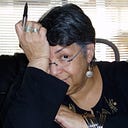“Air Quotes”: Exploring The Myth of the “Strong Black Woman”
Identifying age-old stereotypes, deciphering racial code language, and redefining her with the help of women writers and poets, as well as Michelle Obama, an elegant First Lady. All of these women found and expressed their own power in their words.
The mythical image of the strong black woman originated as far back as the onset of slavery and has evolved continuously over the years. But of all the enduring negative cultural myths in 21stCentury America, this one is particularly troubling for future generations. Translating racial code in today’s world, the term “strong black woman” invariably means “angry black woman”, and white society has been attempting to define us as such for many years. During slavery days, black women were perceived as being “strong like a man” when they could do the same field work as their menfolk while birthin’ babies and nursing and caring for their master’s children as well. The days of minstrelsy produced loveable, grinning Aunt Jemima with her ready batch of flapjacks and syrup. Then it was on to such reincarnations as the non-threatening, a-sexual “Mammy”/beast of burden; the “angry” finger-pointing shrew, Sapphire; the manipulative “Jezebel”; the emasculating “superwoman”; and finally, the promiscuous “hyper-sexual whore”. We have been labeled with every conceivable negative stereotype and caricature of black womanhood imaginable.
As Laini Mataka describes in her searing obituary of the long-standing myth: The Strong Black Woman Is Dead : “…the strong Black woman who carried her family in her belly, the community on her head, and the race on her back is dead. She died while struggling with the reality of being a human instead of a myth. The strong black woman passed away. Medical sources say she died of natural causes, but those who knew her know that she died from being silent when she should have been screaming, smiling when she should have been raging, from being sick and not wanting anyone to know because her pain might inconvenience them. She died from an overdose of other people clinging to her when she didn’t even have energy for herself.”
Ms. Mataka’s goes even further in another one of her books, Being A Strong Black Woman Can Get You Killed. But powerful monologue notwithstanding, and even though there is some truth in every line of what she wrote, I have a different view.
The strong black woman is not in fact dead. She lives, and she is being redefined by the most visible black woman in the world today, Michelle Obama. The strong black woman lives. She is alive and present in the spirits of our female ancestors. She lives and breathes in the words of black women poets and writers whose works celebrate black womanhood, embody the warrior spirit and takes exceptional pride in her race and her gender and her community. I submit that the woman Ms. Mataka eulogizes has numerous sister friends. They are courageous and powerful black women and they are always there for her, in the words and expressions they painstakingly committed to paper for publication. Even those who have passed on have left a rich and rewarding legacy to be drawn from. These women were strong and resilient in the face of tremendous adversity. They faced the unknown. They struggled and worked exceedingly hard, often while juggling motherhood, jobs, and myriad familial obligations in a patriarchal society.
Four years ago, in Michelle Obama, we were presented with a new version of black womanhood in which we can all take enormous pride. And almost immediately, the negative stereotypes were unleashed. But in spite of how frequently there are attempts in the media to portray her as the “strong (read angry) black woman” in the White House, she wisely and admirably refuses to be categorized or caricatured as such. Even though she is consistently criticized for everything from statements she has made, to wardrobe choices, to healthy eating and the selection of vegetables to plant in the White House garden, her demeanor has remained cool and calm. She is utterly unflappable. Poised and extremely pleasant in the face of attacks that none of her predecessors ever had to deal with.
Aside from the obvious, consider the tremendous personal sacrifice she has made to support her husband. This brilliant young Harvard Law and Princeton educated woman, ended a promising career, putting her own career aspirations on hold. One need only imagine the inner struggle it took for her to make a decision in the interest of her family as well as the greater good of the country.
Michelle Obama has completely shattered the myth. She is the absolute antithesis of the negative “angry black woman” stereotype. The strong black woman lives, and she is not angry. She has at last been re-defined for the 21st Century. The strong black woman has been redefined, and for eight years, the standard bearer was Michelle Obama, the wife of Barack Obama, the President of the United States and our First Lady. And she honored her role and carried the title magnificently.
Originally published at aundrawilliscarrasco.tumblr.com.
